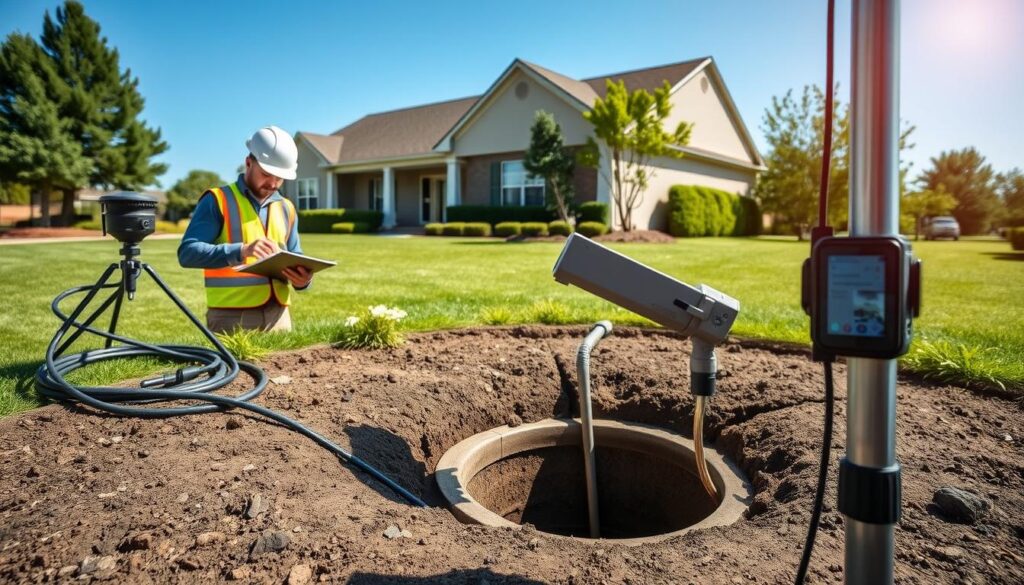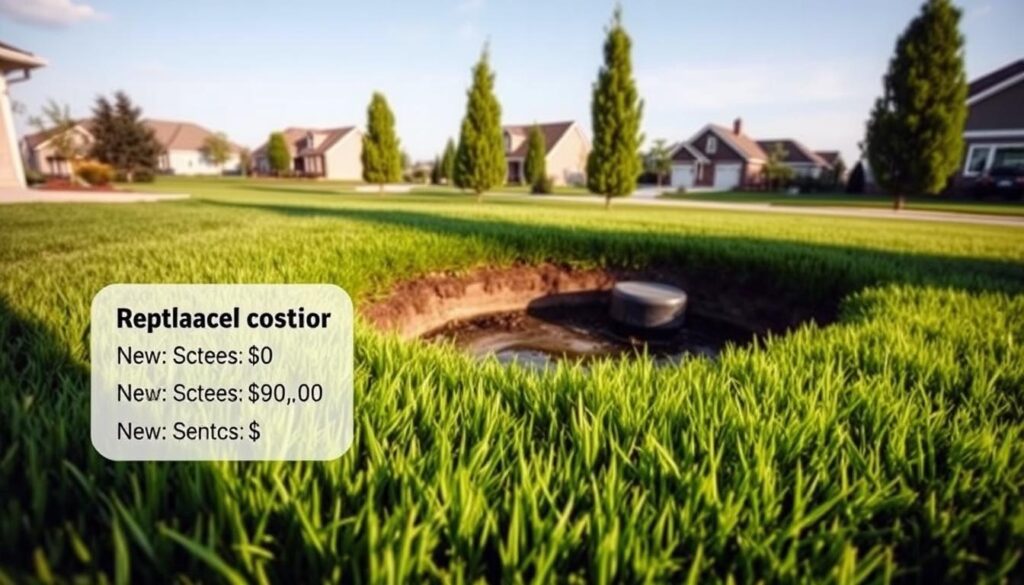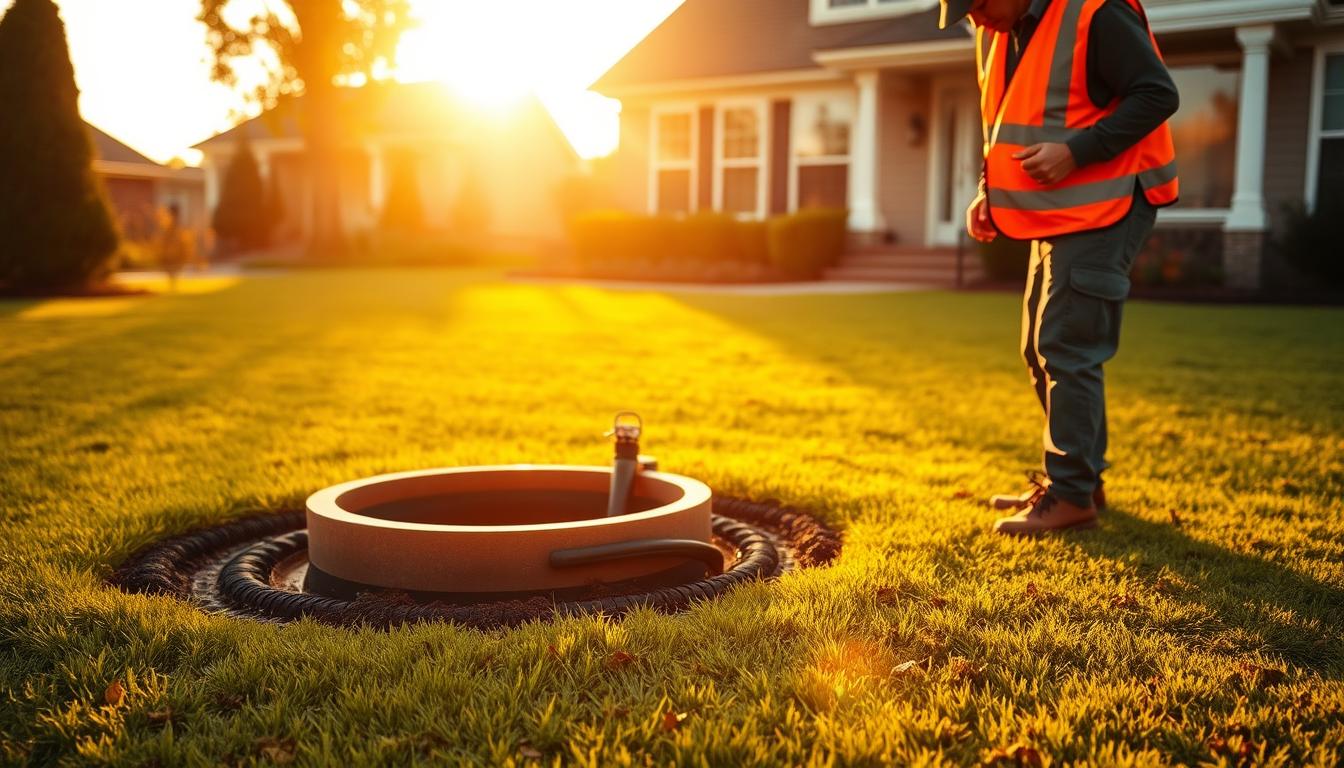Are you aware that neglecting your septic system maintenance can significantly impact your property’s value? A well-functioning septic system is crucial for effective household wastewater treatment and protecting your investment in your home.
According to the US EPA, regular septic system care is essential to prevent potential issues that can arise from poor maintenance. By maintaining your septic system, you can ensure it operates efficiently and effectively, thereby safeguarding your property’s value.
Key Takeaways
- Regular septic system maintenance is crucial for property value protection.
- A well-maintained septic system ensures effective household wastewater treatment.
- Neglecting septic system care can lead to significant property value impact.
- Proper septic system maintenance protects your investment in your home.
- Regular checks can help identify potential issues early on.
The Hidden Connection Between Septic Systems and Home Value
A well-maintained septic system is not just a necessity for environmental and health reasons; it also impacts property value. Homebuyers are increasingly aware of the importance of a functioning septic system, and its condition can be a significant factor in their purchasing decision.
What Potential Buyers Look For
Potential buyers typically look for homes with well-maintained septic systems to avoid future septic system problems and costly repairs. A properly functioning septic system indicates that the property has been well cared for, providing peace of mind for the buyer. Key factors include:
- Recent septic system inspections and maintenance records
- No history of major septic system repair needs
- Compliance with local septic system regulations
The Cost of Neglect in Real Estate Transactions
Neglecting septic system maintenance can lead to significant financial losses during real estate transactions. Buyers may request discounts or repairs if they discover issues with the septic system during inspections. In severe cases, a malfunctioning septic system can even derail a sale. The costs associated with neglecting septic system maintenance far outweigh the costs of regular upkeep.
Understanding Your Septic System: The Basics
Understanding the fundamentals of your septic system is crucial for maintaining its efficiency and prolonging its lifespan. A septic system is a complex network that treats wastewater from your home, and its proper functioning is vital for both your property’s value and the environment.
How Septic Systems Work
A typical septic system consists of a pipe from the home, a septic tank, a drain field, and the soil. Wastewater flows from the house into the septic tank, where solids settle and are broken down by bacteria. The liquid then moves to the drain field, where it’s filtered and treated by the soil.
Regular maintenance is essential to ensure the system operates correctly, including regular inspections and pumping of the septic tank.
Types of Septic Systems Common in the US
There are several types of septic systems used in the US, primarily categorized into conventional and alternative systems.
Conventional Systems
Conventional septic systems are the most common type, relying on gravity to move wastewater through the system. They are suitable for areas with suitable soil conditions and adequate space for a drain field.
Alternative Systems
Alternative septic systems use new technology to improve treatment processes, making them suitable for areas with challenging soil conditions or environmental concerns. Examples include aerobic treatment units and constructed wetlands.
| System Type | Description | Suitability |
|---|---|---|
| Conventional | Rely on gravity, simple design | Areas with suitable soil, adequate space |
| Alternative | Utilize advanced technology for treatment | Areas with challenging soil or environmental concerns |
How a Poorly Maintained Septic System Can Hurt Your Property Value
The condition of your septic system plays a crucial role in determining your property’s value. A poorly maintained septic system can lead to a range of issues that negatively impact your property’s worth. In this section, we will explore the immediate and long-term financial impacts of neglecting your septic system.
Immediate Financial Impacts
A failing septic system can result in immediate financial burdens. Homeowners may face costly repairs or even replacement of the system if it’s not properly maintained. Regular maintenance is key to avoiding these unexpected expenses. For instance, neglecting regular pumping can lead to system failures, which can be expensive to fix.
Here is a breakdown of potential immediate costs:
| Issue | Average Cost |
|---|---|
| Septic System Pumping | $200-$500 |
| Repairing a Leaking Drainfield | $1,000-$3,000 |
| Replacing a Failed Septic System | $3,000-$10,000 |
Long-term Devaluation Concerns
A poorly maintained septic system can also have long-term effects on your property’s value. Potential buyers are often wary of properties with a history of septic issues. This concern can lead to decreased property appraisal values and financing challenges for buyers.
Property Appraisal Decrease
A history of septic system problems can decrease your property’s appraisal value. Appraisers consider the condition and maintenance history of the septic system when evaluating the property’s worth.
Financing Challenges for Buyers
Buyers may face difficulties in securing financing for properties with known septic system issues. Lenders are cautious about providing mortgages for properties with potential environmental and maintenance concerns.
In conclusion, maintaining your septic system is crucial for protecting your property’s value. By understanding the immediate and long-term financial impacts of a poorly maintained septic system, homeowners can take proactive steps to avoid costly issues.
Warning Signs of Septic System Problems
Identifying the warning signs of septic system problems is crucial for maintaining your property’s value. A septic system that is not functioning correctly can lead to a myriad of issues, from unpleasant odors to costly repairs. Being aware of these signs can help you address problems early, potentially saving you thousands of dollars in the long run.
Visual Indicators Around Your Property
One of the first signs of a septic system issue is visual changes around your property. Look out for lush or soggy areas in your yard, which could indicate a leak or overflow from your septic system. Additionally, unusual grass growth or pooling water near the drain field can signal a problem. If you notice these visual cues, it’s essential to investigate further.
Unusual Odors and Drainage Issues
Unpleasant odors around your property, particularly near the septic tank or drain field, can be a clear indicator of a problem. Drainage issues, such as slow drains or backups, are also red flags. If your sinks, toilets, or showers are draining slower than usual, or if you experience frequent backups, it may be a sign that your septic system is failing.
Indoor Plumbing Red Flags
Indoor plumbing issues can also signal septic system problems. Multiple clogged drains or toilets that are constantly backing up are indicators that your septic system might be overwhelmed or failing. Additionally, gurgling sounds from your drains can suggest that your septic system is not venting properly, potentially leading to more severe issues if not addressed.
Essential Septic System Maintenance Practices
Proper septic system maintenance is not just about avoiding problems; it’s also about preserving your property’s worth. A well-maintained septic system ensures that your home remains a valuable and healthy living environment.
Regular Pumping Schedule
One of the most critical aspects of septic system maintenance is adhering to a regular pumping schedule. Experts recommend pumping your septic tank every 3 to 5 years, depending on the size of your tank and the number of people living in your household. Regular pumping helps prevent the buildup of solids that can lead to system failure.
Water Conservation Strategies
Conserving water is not only good for the environment, but it’s also beneficial for your septic system. Excessive water usage can overload your septic system, leading to potential failures. Implementing water-saving measures such as fixing leaks, installing low-flow fixtures, and being mindful of your water usage can help maintain your system’s health.
What Not to Flush or Drain
Being mindful of what you flush or drain is crucial for the longevity of your septic system. Certain items can cause significant harm to your system and should be avoided.
Household Chemicals to Avoid
- Harsh chemicals like bleach and drain cleaners can kill the beneficial bacteria in your septic tank, leading to system imbalance.
- Chemicals such as paint thinner and pesticides should never be disposed of through your septic system.
Food Waste Considerations
- Avoid putting excessive food waste down your drains, as it can accumulate in your septic tank and cause issues.
- Using a garbage disposal increases the amount of solids in your septic tank, so it’s advisable to limit its use.
By following these essential maintenance practices, you can ensure your septic system operates efficiently and effectively, protecting your property value and avoiding costly repairs.
Professional Septic System Inspections: What to Expect
Understanding what to expect from a professional septic system inspection can help homeowners maintain their property’s value. Regular inspections by qualified professionals are crucial for identifying potential issues before they become major problems.

Recommended Inspection Frequency
The frequency of septic system inspections depends on several factors, including the size of your household and the capacity of your septic tank. Generally, it’s recommended to have your septic system inspected every 1-3 years. This frequency helps in early detection of potential problems, reducing the risk of costly repairs.
Finding Qualified Inspectors
Finding a qualified inspector is crucial for a thorough and accurate assessment of your septic system. Look for professionals who are certified by state or local health departments and have experience with septic system inspections. Checking references and reviews can also help ensure you’re hiring a competent inspector.
Documentation for Property Value Protection
After an inspection, it’s essential to keep detailed records of the findings and any subsequent maintenance or repairs. This documentation can be invaluable when selling your property, as it provides proof of proper septic system maintenance, potentially increasing your property’s value and appeal to buyers.
Septic System Repairs: Addressing Issues Before They Affect Value
When it comes to preserving your home’s value, addressing septic system issues promptly is essential. A neglected septic system can lead to costly repairs and potentially harm your property’s worth.
Common Repair Needs and Costs
Septic system repairs often involve fixing leaks, replacing damaged components, and addressing issues with the drainfield. The cost of these repairs can vary widely, depending on the nature of the problem and the materials needed.
- Leak repairs: $200-$1,000
- Component replacement: $500-$2,500
- Drainfield repairs: $1,000-$5,000
Regular maintenance can help identify potential issues before they become major problems, reducing the overall cost of repairs.
DIY vs. Professional Repairs
Homeowners must decide whether to tackle septic system repairs themselves or hire a professional. While DIY repairs can be cost-effective, they require a certain level of expertise and can be risky if not done correctly.
When to Call the Professionals
If you’re unsure about the nature of the problem or the necessary repairs, it’s best to call a professional. Complex issues, such as those involving the drainfield or major component failures, typically require expert attention.
Safe DIY Maintenance Tasks
Some maintenance tasks, such as inspecting the system and performing routine checks, can be safely done by homeowners. However, it’s crucial to follow best practices and guidelines to avoid causing further damage.
By understanding your septic system’s needs and addressing issues promptly, you can protect your property value and avoid costly repairs down the line.
Septic System Replacement: The Ultimate Investment
Understanding the process and benefits of septic system replacement is crucial for homeowners looking to protect their investment. A failing septic system can lead to significant financial losses if not addressed promptly.
Signs It’s Time for a Complete Replacement
Frequent backups, system failures, and persistent odors are clear indicators that your septic system needs to be replaced. Ignoring these signs can lead to more severe problems, including property damage and health hazards.
“A well-maintained septic system is key to avoiding costly replacements,” says an industry expert. “Homeowners should be vigilant about monitoring their system’s performance.”
Modern System Options and Their Value Impact
Modern septic systems offer improved efficiency and environmental sustainability. Advanced treatment systems, for example, can significantly reduce the environmental footprint of your property, potentially increasing its value.
New systems can also provide better wastewater treatment, reducing the risk of contamination and improving overall property safety.
Financing Your Septic Replacement
Replacing a septic system can be costly, but there are financing options available to homeowners. Understanding these options is crucial for managing the financial impact of replacement.
Septic System Replacement Costs
The cost of replacing a septic system varies widely, depending on factors such as system size, type, and local regulations. On average, homeowners can expect to pay between $10,000 to $20,000 for a new system.
| System Type | Average Cost | Factors Affecting Cost |
|---|---|---|
| Conventional | $10,000 – $15,000 | Soil type, system size |
| Advanced Treatment | $15,000 – $25,000 | Technology, installation complexity |
Available Assistance Programs
There are various assistance programs available to help homeowners finance their septic system replacements. These include government grants and low-interest loans.
Homeowners should research local and state programs to determine their eligibility for financial assistance.

Legal and Environmental Considerations
Understanding the legal and environmental implications of your septic system is crucial for maintaining property value. Homeowners must navigate a complex landscape of regulations and compliance issues to ensure their septic system does not become a liability.
Disclosure Requirements When Selling
When selling a property, homeowners are typically required to disclose information about their septic system. This can include details about the system’s condition, maintenance history, and any known issues. Failure to disclose such information can lead to legal repercussions, making it essential for sellers to be transparent about their septic system’s status.
Potential buyers often request septic system inspections as part of the home buying process. Sellers should be prepared to provide documentation of regular maintenance and inspections to demonstrate the system’s integrity.
Environmental Regulations and Compliance
Septic systems are subject to various environmental regulations designed to protect water quality and public health. Compliance with these regulations is not only legally required but also crucial for preventing environmental harm. Local health departments and environmental agencies often oversee septic system regulations, which can vary significantly by jurisdiction.
Local Code Requirements
Local code requirements for septic systems can dictate everything from the type of system allowed in a particular area to the frequency of inspections and maintenance. Homeowners must familiarize themselves with these codes to avoid non-compliance.
Watershed Protection Concerns
Septic systems located near watersheds or other sensitive environmental areas are subject to additional regulations aimed at protecting these ecosystems. Ensuring that your septic system is properly maintained is critical for preventing contamination of nearby water sources.
Conclusion: Protecting Your Investment Through Proper Septic Care
Proper septic care is essential for protecting your investment in your home. A well-maintained septic system not only ensures a safe and healthy environment but also preserves your property’s value. By understanding the importance of regular maintenance, being aware of the warning signs of potential issues, and taking proactive steps to address problems, you can safeguard your investment.
Effective septic system care involves regular pumping, water conservation, and being mindful of what you flush or drain. It’s also crucial to have professional inspections and address any repairs promptly. By doing so, you can prevent costly issues and ensure your septic system operates efficiently, thereby protecting your property value.
By prioritizing septic system care, you’re not only maintaining your home’s value but also contributing to environmental protection. Proper septic care is a critical aspect of responsible homeownership, and by following the guidelines outlined in this article, you can enjoy a safe, healthy, and valuable property for years to come, thus protecting your investment.

